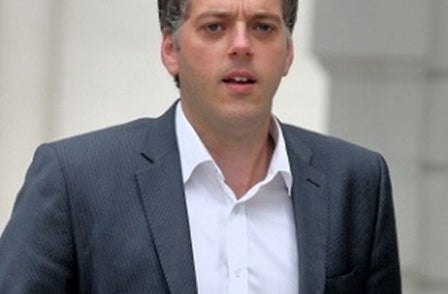
Iain Lee, the former BBC presenter, said he was “flabbergasted” and he didn’t know what he done “wrong” after the BBC Trust ruled that his on-air clash with a Christian lawyer in which he called her a bigot breached editorial rules.
The BBC Trust’s Editorial Standards Committee (ESC) said that Lee was in breach of the editorial guidelines on impartiality after he was involved in a verbal sparring match with Libby Powell, a lawyer from Christian Concern, a conservative Christian group which opposes LGBT rights.
Lee, a stand-up comedian and former presenter of Channel 4’s The 11 O’Clock show, left the BBC in November 2015, just two weeks after the spat on his Three Counties breakfast show.
Following the ruling by the ESC, the presenter took to Twitter to express his disbelief. He said: “Genuinely, I’m flabbergasted” adding “honestly I don’t know what I did wrong”.
Powell had appeared on the show to defend a Christian minister who was disciplined for reading out passages from the Bible condemning homosexuality during a service at a prison.
During the interview, Lee asked Powell: “Do you support bigotry? Yes, homophobia is bigotry… I guess you don’t know what the definition of bigotry is—and considering you’re from a legal centre, that’s a little bit worrying.”
Lee later asked: “What do the gays have to do to be forgiven by your ever-so-loving God?” When Powell referred to the meaning of “homophobia” Lee replied: “… don’t try and do the cute answers with me.”
When Powell said that, like Lee, she was a sinner, Lee said: “I am absolutely nothing like you, absolutely nothing like you, cos I don’t think I am a bigot.”
Lee read out an on-air apology the day after the interview and the BBC issued an apology a week after the interview.
Ofcom, the media regulator, received six complaints relating to the interview but in December last year decided not to launch a formal probe.
In its ruling, the ESC said it had received a number of complaints following the broadcast and, following consideration, had ruled that the interview was a “serious breach of editorial guidelines for impartiality”.
The ESC said: “Where presenters appeared to defend a particular stand on an issue in an inappropriately combative manner the effect was not to broaden debate but was likely to be the opposite- as potential callers might be less likely to contact a radio station if they fell they would not receive a fair hearing.”
The ESC said that Lee’s tone was “unduly confrontational”.
It said: "This breach of impartiality followed occasions when other local radio presenters, while endeavouring to engage with audiences, had voiced personal opinions, in breach of the Editorial Guidelines. Trustees noted that the Executive was also concerned about this and had produced a face to face training programme for presenters and their programme teams that would be rolled out across the BBC’s local radio services in the first quarter of 2016."
Email pged@pressgazette.co.uk to point out mistakes, provide story tips or send in a letter for publication on our "Letters Page" blog
